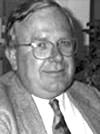 Michael Merzenich
Michael Merzenich, Ph.D.is Francis A. Sooy
Chair of Otolaryngology in the Keck Center for Integrative Neurosciences at the
University of California at San Francisco. He is a scientist and educator, and
founder of Scientific Learning Corporation and Neuroscience Solutions Corporation,
companies that develop therapeutic programs for the neurologically and
psychiatrically impaired. With his wife Diane, he established the Merzenich
Chair in Education at the University
of Portland - a gift to their
Defining Moment Campaign. Mezernich is an expert on "brain
plasticity" underlying the development of skills and abilities through
experience and learning. He is a medical inventor who has been awarded more
than 50 patents. His group developed the first models of a commercial (Clarion)
cochlear implant. As a software developer, he has contributed to the creation
of a number of therapeutic training programs targeting impaired populations.
Among his awards are the international Ipsen and Zülch Prizes, honoring his
work in brain plasticity. Merzenich is a member of the National Academy of
Sciences. Merzenich is editor of Cochlear Implants (Raven Press, 1985).
Selected Bibliography
Kilgard, M. P. and M. Merzenich. Cortical
Map Reorganization Enabled by Nucleus Basalis Activity. Science: 1998.
Merzenich, Michael, et al. Temporal
Processing Deficits of Language-Learning Impaired Children. Science: 1996.
Merzenich, Michael and Robert Schindler
(Eds.). Cochlear Implants. Raven Press: 1985.
|
|
To return to previous topic, click on your browser's 'Back' button. |
Email
link |
|